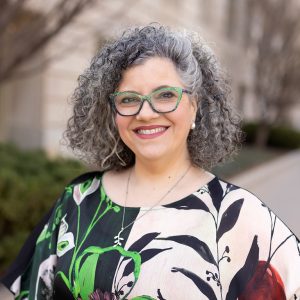What is a school librarian?
Media specialist, school librarian, teacher librarian, digital literacy teacher. All these terms are used to describe the role of the librarian in a K-12 school. For this chapter, we will use the term school librarian as we approach two of the distinct roles of the job: 1) Teacher: an instructor in the specialty of library and literacy skills and 2) Librarian: an administrator and manager of the school’s library program and space.
What this job looks like varies from state to state, district to district, even school to school. In some school districts, a school librarian may be assigned to one specific building, while in others they are assigned to manage the library program across the district, moving between buildings and fulfilling duties.
The main organization overseeing the profession of school librarianship in North America is the American Association of School Librarians (AASL). Additional organizations that play an important role in shaping school librarian professional practice are the International Society for Technology in Education (ISTE), the National Council of Teachers of English (NCTE), the Association for Libraries Service to Children (ALSC), and the Young Adult Library Services Association (YALSA). Many of these organizations, including the umbrella association, the American Library Association, also support state chapters. As an example, here in the state of Iowa school librarians are represented by the Iowa Library Association (ILA), and the Iowa Association of School Librarians (IASL).
Core functions or responsibilities
The School Librarian Evaluation Instrument (SLEI) developed by the Georgia School Library Media Specialist Consortium, is an excellent instrument for identifying and describing the core functions and responsibilities of a school librarian. We’ve divided them under the two distinct aspects of the job: the teacher, and the librarian.
Teacher
First and foremost, the school librarian is a teacher. They are expected to maintain the school library as a large classroom: safe, welcoming, and flexible so that it can be adjusted to meet the needs of all students and teachers. Like other teachers, the school librarian sets policies and behavioral expectations, communicating these to all students.
The school librarian is an instructional partner, co-planning, co-teaching, and co-assessing instruction with classroom teachers. They align all school library programming and curriculum to district and state standards (both library standards and discipline standards), develop curriculum timelines, identify and implement effective instructional strategies, and provide data and resources supporting the differentiated learning needs of all students.
Whether co-teaching or lead teaching, the school librarian oversees instruction on information literacy, media literacy, and technology literacy, not just for students but also for teachers and other educational partners. They are responsible for embedding instruction on digital citizenship: the legal, ethical, and social responsibilities in the use, access, and creation of information. As an instructional leader, the school librarian often serves on school academic and decision-making teams, designs and presents professional development for teachers, and makes purchasing decisions in support of local school improvement goals.
School librarians
The school librarian is responsible for creating an environment where independent reading and self-selection are valued, promoted, and encouraged. Through the management of the library space, the books and materials purchased, and policies and procedures implemented, the school librarian fosters a rich culture of reading so that students read, write and listen for both academic learning and personal pleasure.
Through promotion and modeling, the school librarian exposes the school community to appropriate practices for inquiry learning and the research process. They are also responsible for maintaining consistency in these practices as students advance to upper grade levels.
In pursuit of continuous program improvement, the school librarian must develop data instruments and then employ these instruments to collect data on instructional partnerships, reading promotions, circulation, and student learning. They then are expected to use this data to develop strategic plans aligning the library’s efforts with the school community’s learning goals. Much of this effort is also tied to budget management, fundraising, grant writing, and professional advocacy.
As with most other library and information professionals, the school librarian is responsible for developing and maintaining the school library collection, always aware that collection development in the school setting prioritizes student learning and supports local school needs and curriculum standards.
What school libraries mean to us
I (Jackie) was first a youth services librarian. The relationships I built with the community and families were meaningful, but often not sustained beyond quick interactions or program participation. I looked into moving into the role of a school librarian because I wanted to have sustained interactions where I got to be part of the academic growth and reading lives as students worked their way through the educational system. When I was a secondary school librarian I worked on a flexible schedule, which allowed for co-teaching, collaboration, and planning with content area teachers while also managing the library and all technology in the school. When I was an elementary school librarian I taught on a fixed schedule as part of the specials rotation (music, art, PE, guidance, technology) while also working to support the classroom teacher goals and building a culture of reading schoolwide. There were many moments of laughter, joy, creativity in this job. I truly loved my time as a school librarian and loved knowing students and their reading identities.
I (Lucy) came to the school library from the music classroom and I maintain to this day these two jobs are not as different as they may seem. In both areas I was responsible for recruiting kids to try new materials, fundraising, helping teachers and parents understand the purpose of a curriculum and space that they were not necessarily familiar with, and working closely with other classroom teachers. As a middle school librarian I oversaw a fixed-flex schedule. Students were scheduled to come see me every 2 weeks for a 30 minute lesson, but in between, teachers could schedule time in the library for research and special projects. I loved being a school librarian. I got to build relationships with students and teachers that were rewarding. It was wonderful to also have each day be a different experience. I miss it. Now I get to work with future school librarians and witness the impact they have on their schools, their students, and their communities. School librarianship isn’t an easy job, but it is extremely emotionally rewarding.
How to thrive in school libraries
School librarians hold a unique role within schools, serving both the curriculum goals through relationships with teachers, administration, instructional coaches yet also as a teacher with sustained relationships that cover many years of a student’s educational journey. A successful school librarian communicates clearly, participates in goals of the school, engages with a variety of students with different developmental and emotional needs. They need to be flexible, patient, and be able to switch tasks quickly and midstream. Many of the qualities of a school teacher overlap with the school librarian. Yet the management of the library needs a person with organized consistency. Keeping up with reading trends and popular culture will help the school librarian curate a collection of books that serves their community of readers. A school librarian will also need to be comfortable advocating. You will need to explain to stakeholders what the job duties include and the positive student impact a strong library program provides. Like other content areas, the school librarian is the singular expert in the field of librarianship in your school, and sometimes district.
Future of the field
School librarianship has been, and will continue to be, an often misunderstood and underfunded professional career. It is, however, incredibly meaningful both in impact to student learning and to the school librarian as a fulfilling career of service. The role of the school library will continue to mirror the curriculum needs of the school. Collection development of physical books will continue to be an important part of this job, alongside the robust and quickly changing digital literacy landscape. The technologies may change, but good teaching is rooted in sound pedagogy that is timeless.
Advice for school librarians
If one is interested in a career as a school librarian, it is recommended to have experience with program planning, lesson plan development, youth services, certification and preparation as a teacher. Sometimes people assume the school library is an easier job, and an escape from the stress of classroom teaching. We are here to tell you this is not the case. In fact, the opposite is true. Being a school librarian is a multi-faceted and complex career and should be approached as a new professional adventure.
Resources for Further Reading, Listening, and Viewing:
“SLEI.” GLMA. https://www.glma-inc.org/slei.
“A Community Action Toolkit – Library Language Course.” A Community Action Toolkit – Library Language Course. https://www.getreadystayready.info/library-language-course.
National School Library Standards, 13 Dec. 2023. https://standards.aasl.org/.
“A Community Action Toolkit – Windows and Mirrors.” A Community Action Toolkit – Windows and Mirrors. https://www.getreadystayready.info/windows-and-mirrors.
Knowledge Quest. https://knowledgequest.org/.
School Library Research. https://www.ala.org/aasl/pubs/slr.
School Libraries Worldwide. https://journals.library.ualberta.ca/slw/index.php/slw/index.
Journal of Research on Libraries and Young Adults. https://www.ala.org/yalsa/products%26publications/yalsapubs/jrlya/journal.
Children and Libraries. https://www.ala.org/alsc/publications-resources/cal.
School Library Journal. https://www.slj.com/.
School Library Connection. https://schoollibraryconnection.com/.
 Jackie Biger has a Master of Library Science from Simmons University with a focus in children’s services. She also has a Master in Teaching degree from the University of Iowa. Her professional experiences include public library and school library positions across the K-12 continuum. Jackie was head of youth services in Amherst, New Hampshire and more recently held positions as teacher librarian in both high school and elementary school settings within the state of Iowa. Jackie is the program coordinator of the teacher librarian program and oversees all school library practicum placements and mentoring.
Jackie Biger has a Master of Library Science from Simmons University with a focus in children’s services. She also has a Master in Teaching degree from the University of Iowa. Her professional experiences include public library and school library positions across the K-12 continuum. Jackie was head of youth services in Amherst, New Hampshire and more recently held positions as teacher librarian in both high school and elementary school settings within the state of Iowa. Jackie is the program coordinator of the teacher librarian program and oversees all school library practicum placements and mentoring.
 Lucy Santos Green joined SLIS as professor and director January 2023. She is co-editor of the International Association of School Librarianship’s peer-reviewed research journal, School Libraries Worldwide, and 2023 president of the Association for Library and Information Science Education. Her latest book is LGBTQIA+ Inclusive Children’s Librarianship: Policies, Programs, and Practices (Bloomsbury, 2022). Green currently leads Online Ready, a federally funded research project that explores ways to help school librarians grow professionally and have meaningful impact on student learning.
Lucy Santos Green joined SLIS as professor and director January 2023. She is co-editor of the International Association of School Librarianship’s peer-reviewed research journal, School Libraries Worldwide, and 2023 president of the Association for Library and Information Science Education. Her latest book is LGBTQIA+ Inclusive Children’s Librarianship: Policies, Programs, and Practices (Bloomsbury, 2022). Green currently leads Online Ready, a federally funded research project that explores ways to help school librarians grow professionally and have meaningful impact on student learning.

